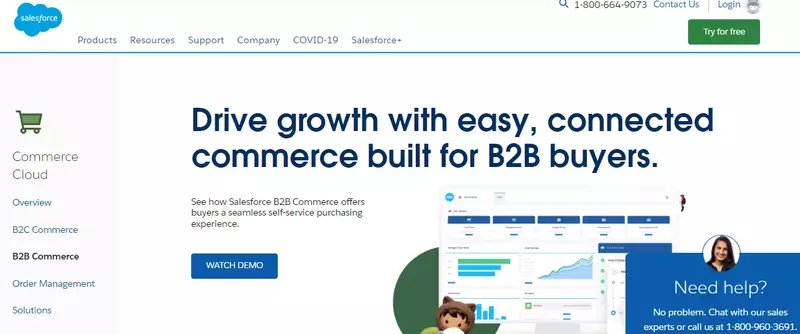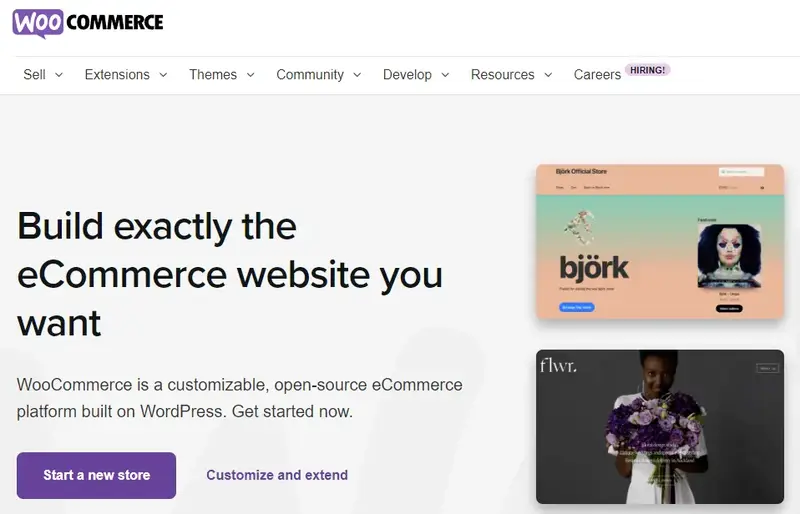If you're not on Magento, then you're missing out. It's the most popular ecommerce platform in use today with over 250,000 installations worldwide!
But what if it doesn't fit your needs?
There are more than a few great alternatives to Magento that can help grow your online business. In this article, I'll show you the best alternative solutions for Magento and why you should consider using them for your ecommerce business.
I’ve also listed their key features and pros and cons so you don’t have much trouble choosing one that best fits your business needs.
Table of Contents
Why You May Need to Look for Magento Alternatives
As someone who has been in the industry for over a decade, I know Magento is a great ecommerce solution. It offers so many great features and benefits that it's hard to find a reason not to use it.
But, there are some cases where Magento may not be the best fit for your ecommerce business. Maybe you're looking for a platform that is more lightweight and faster to load? Or, maybe you need more features than what Magento offers?
Let’s discuss some other reasons why you may need to consider using Magento alternatives.
Magento is Expensive
Magento Open Source is technically free but only if you don't want to make any changes to your website.
You will actually need to pay for all of the design and development to keep your website up and running. Additionally, you’ll have to bear expenses such as support costs, ecommerce security, hosting, and regular maintenance charges for your Magento website.
Magento Commerce costs will vary based on the average order value (AOV) and annual online revenue of your ecommerce store. This can start at $22,000 per year and go all the way up to $125,000 a year.
Other plans, like Magento Commerce Cloud (now part of Adobe Commerce Cloud), are even more expensive. Not every business can choose these solutions.
Magento Requires Programming Expertise
Developing and installing Magento websites requires knowledge of software development. While Magento offers unlimited customization options to create various applications, you will need high-level technical knowledge and programming expertise to make the most of it.
If you’re not skilled, you will probably need to hire an experienced web developer or even a team of professionals to get your site up and running.
Whereas, there are many great alternative solutions to Magento such as SaaS platforms like BigCommerce that let anybody create a professional-looking website fast.
Building a Magento Website Takes a Lot of Time
One of the biggest USPs (unique selling points) of Magento is its flexibility and extreme customization options. But making complex changes to a website's structure takes a lot of time.
Even a basic website could take anywhere from six weeks to a year to build. You'll also need professional developers to regularly monitor and update your website.
Magento is Insecure
One of the biggest complaints about Magento is its security vulnerabilities.
Magento is an open-source ecommerce platform and, therefore, hackers have access to all of its codes. They are well aware of the loopholes in the Magento code and often use them to target Magento stores.
Magento is Slow
This is one of the biggest reasons why you should consider using a Magento alternative. Magento stores are known for slow performance that can affect your ecommerce conversion rates and overall revenue.
Magento's ecommerce platform was initially designed to work on underpowered servers, leading to poor load times, low site speed, etc.
Even with an optimized Magento website, you may not be able to achieve the page load times that are required in today's competitive ecommerce market.
Top 5 Magento Alternatives
If you're not happy with Magento for any reason – too slow, need better security, more flexibility/features, or if it doesn’t fit your needs, don’t worry.
There are many great Magento alternatives that you can consider using in 2024. Let’s take a look at some of the best Magento alternatives.
1. BigCommerce
BigCommerce is a SaaS (Software-as-a-Service) ecommerce platform. It offers a wide range of features and is very fast and lightweight.
It’s also PCI compliant, which is important for any ecommerce store that accepts payments online. You get best-in-class security and DDoS protection with hosting on Google Cloud.
Additionally, BigCommerce has a great customer support team that can help you with any issue you may have.
Key Features
- Comprehensive order management feature that lets you manage all your orders in one place
- Multi-currency support, allowing online stores to better cater to international customers
- Highly customizable design options and themes so you can create a unique ecommerce store without having an expert web developer
- Badge management feature for award-winning ecommerce stores
- Abandoned cart recovery feature to recover any lost sales
- Built-in marketing tools
Pros
- Flexible pricing plans, including a free plan with unlimited products
- Customer support team available via phone and email to assist with any issue at all times
Cons
- Unlike Magento, BigCommerce doesn’t yet offer a native multi-store functionality. However, you can use its headless commerce configuration for this.
Pricing
- BigCommerce offers a free 15-day trial
- Standard plan: $29.95/month
- Plus plan: $79.95/month
- Pro plan: $229.95/month
- Enterprise plan: Contact them at 1-866-991-0872 for custom pricing
Why Choose BigCommerce?
BigCommerce is a great alternative to Magento if you want an ecommerce platform that requires little or no programming expertise and offers a wide range of features.
Check out my detailed review of BigCommerce for more information.
2. Shopify
Shopify has also become a popular online shopping platform for ecommerce stores due to its ease-of-service functionality for online selling. It is a fully hosted ecommerce platform that offers a wide range of features.
Both small and large business owners are trusting Shopify to build a mobile-responsive ecommerce website for their online stores. This ecommerce platform is also fully integrated with a wide range of third-party apps, including social media and accounting solutions.
However, one major drawback of using Shopify is that when you leave the Shopify app, all of the personal information in your account will be permanently removed.
Key Features
- Easy-to-use storefront designs
- Seamless content management system (CMS)
- Built-in SEO features to help you rank higher on search engine results pages
- Abandoned cart recovery feature to recover any lost sales
- Shopify Point of Sale (POS) lets you manage your ecommerce and retail stores together
- Social media integration for a more personalized customer experience
Pros
- User-friendly interface that is easy for anyone to use, even if you don’t have any prior experience in ecommerce
- 24/hour customer support through chat, phone, and email
Cons
- If you are not using Shopify Shipping, it can be quite expensive to provide real-time carrier quotes to your customers.
- Professional reporting functionality is only included in the higher-priced plans.
- Shopify charges a transaction fee if you use a payment gateway other than Shopify Payments.
Pricing
- Shopify offers a 14-day free trial for all plans.
- Basic Shopify plan: $29/month
- Shopify plan: $79/month
- Advanced Shopify plan: $299/month
- Shopify Plus plan for high-volume merchants and large businesses: Contact their sales team for a custom quote
Why Choose Shopify?
Shopify is an excellent Magento alternative if you want a fully-hosted ecommerce platform that does not require any technical skills. It offers more flexibility than Magento.
Also, check out my comparison post on BigCommerce vs. Shopify.
3. Big Cartel
Like Shopify, Big Cartel is a fully-hosted ecommerce platform. It is designed for small businesses and offers a wide range of features, including an easy-to-use interface, a wide range of templates, and social media integration.
Key Features
- Mobile-responsive design that lets you build a functional mobile ecommerce store
- Abandoned cart recovery feature to recover any lost sales
- 24/hour customer support through chat and email
- Wide range of templates to choose from that are highly customizable
- Facebook integration for a more personalized customer experience
Pros
- Built-in SEO features to help you rank higher on the search engine results pages
- A very easy-to-use interface that is perfect for small business owners who are not tech-savvy
- Allows you to sell online and in-person
- Very affordable and has a free forever plan
Cons
- Their basic plan only lets you display one image per product for up to 5 products only
- Not an ideal ecommerce platform for large businesses and online stores that need advanced ecommerce capabilities
- Limited payment options
Pricing
- Gold plan: Big Cartel offers a free forever plan for up to 5 products. No credit card needed
- Platinum plan: $9.99/month for up to 50 products
- Diamond plan: $19.99/month for up to 500 products
Why Choose Big Cartel?
Big Cartel is a great alternative to Magento if you want to sell limited products and are looking for an ecommerce platform that is easy to use. It is perfect for small businesses and creative artists and makers who want to start selling online without having to hire a developer.
Choose this ecommerce platform only if you have to sell only a few products at a time such as custom, handmade, or limited edition products. Big Cartel was made with artists in mind and it suits creative online stores the best.
However, if you have a high-revenue business or an extensive product catalog, BigCommerce is a better alternative to Magento Enterprise Edition.
4. Salesforce Commerce Cloud
Salesforce Commerce Cloud is an enterprise ecommerce platform that offers a wide range of features, including advanced personalization, marketing automation, and order management features.
It is designed for larger businesses and requires some programming knowledge to use.
Key Features
- Abandoned cart recovery feature to recover any lost sales
- Integrated with a wide range of third-party apps, including social media and accounting solutions
- Fully customizable to meet the specific needs of your business
- Order management features that let you manage your entire ecommerce business from one platform
- The world’s #1 CRM (customer relationship management) solution to help you provide seamless post-purchase journeys
- Strong native merchandising features
Pros
- Very advanced personalization and marketing automation features that let you create a more personalized customer experience
- An agile, scalable, and secure platform that enables you to adapt quickly to consumer demands
- One of the few ecommerce platforms that are a good fit for both B2C and B2B ecommerce businesses
Cons
- Confusing user interface and hard-to-access features
- Not suitable for small businesses
- The need for training, experience, and time using Salesforce Commerce Cloud can make this a difficult switch to make.
Pricing
- Salesforce B2B Commerce editions: $4/order, $6/order, and $8/order
- Salesforce B2C Commerce editions: 1%, 2%, and 3% Gross Merchandise Value plans
- Salesforce B2B2C Commerce pricing: 1% Gross Merchandise Value
Why Choose Salesforce Commerce Cloud?
If you have a larger business with a budget and some programming knowledge, then Salesforce Commerce Cloud is an excellent Magento alternative.
It offers a wide range of features that let you create a more personalized customer experience and manage your entire ecommerce business from one platform.
5. WooCommerce
WooCommerce is an open-source Magento alternative that is designed for WordPress users. It is also compatible with a wide range of WordPress plugins and themes, including the official WooCommerce theme.
Key Features
- Very flexible design that lets you create a storefront as unique as your business with the help of hundreds of plugins and themes
- Easy to use, so you do not need any programming knowledge or technical skills to manage your online store
- Mobile-responsive to help you reach a wider audience
Pros
- Open-source to let anyone contribute or create themes and plugins, resulting in an ever-growing selection of free and premium themes
- Very easy to use
- It does not require any technical knowledge or special programming skills
- Online stores built with WooCommerce can leverage the WordPress blogging platform natively.
Cons
- The basic WooCommerce plugin is technically free but you will have to pay for add-ons, themes, web hosting, and other essential features and capabilities.
Pricing
- WooCommerce and WordPress are both open-source platforms, which means that they are completely free. However, you’ll need to pay for hosting, premium themes, add-on plugins, and more, depending on the functionality you want to ass to your ecommerce store.
Why Choose WooCommerce?
If you want to add ecommerce functionality to an existing WordPress site, WooCommerce is an excellent Magento alternative. It offers more flexibility than other ecommerce platforms and is more affordable than Magento alternatives like Salesforce Commerce Cloud.
You May Also Like:
FAQs
1. Is Magento still relevant?
Yes, Magento is still relevant. Many businesses, including some of the largest ecommerce companies in the world, continue to use Magento.
2. Is Magento no longer free?
No, Magento Open Source is still free. It offers a wide range of features, including advanced personalization and marketing automation features, that let you create a more personalized customer experience and manage your entire ecommerce business from one platform.
However, you need to hire a team of Magento web developers if you want to use these features effectively.
Leveraging Magento Commerce and Magento Commerce Cloud (now known as “Adobe Commerce Cloud”) for advanced features also costs money.
3. Is Magento similar to Shopify?
Magento is similar to Shopify in that they both offer advanced features like marketing automation and personalization, but Magento requires some programming knowledge while Shopify is more user-friendly.
4. Why is Magento so expensive?
Magento is not expensive if you have a business that already hires Magento web developers to improve your site's performance and usability.
However, if you have a small business or are an individual without programming knowledge, then Magento is expensive. You will need to hire experienced Magento developers to build, maintain, and scale your Magento online store.
In that case, I recommend using easy-to-use Magento alternatives like BigCommerce and WooCommerce. These ecommerce platforms let you build fully-functional stores fast without any coding knowledge or technical expertise.
5. What are the advantages of using BigCommerce over Magento?
BigCommerce offers similar features to Magento such as advanced personalization and marketing automation tools for building a more personalized customer experience.
However, BigCommerce is more user-friendly and does not require any programming knowledge or special skills to use.
It also offers a wide selection of themes and plugins that you can use to improve your site's design and functionality without the need for expensive and time-consuming Magento development.
6. What are some alternatives to Magento?
Some of the best Magento alternatives are:
- BigCommerce
- Shopify
- Big Cartel
- Salesforce Commerce Cloud
- WooCommerce
Check out other useful ecommerce platforms and software solutions here.
Ready to Choose the Best Magento Alternative for Your Ecommerce Business?
Magento is a great ecommerce platform, but it is expensive to use for those without Magento development experience. Being an open-source ecommerce platform, it also brings security risks to the Magento store.
If you're not happy with using Magento due to security risks, cost, or Magento development concerns, then using an alternative to Magento may be a perfect solution.
Although BigCommerce, WooCommerce, or Shopify do not offer all the features that Magento does, they are all excellent Magento alternatives that can be customized to meet your online store needs.
Before making your final decision, you should try to understand what benefits and drawbacks each of these Magento alternative solutions have.
Do you need help building your ecommerce business website or increasing conversions? Feel free to reach out to our team of experts to create a user-centric, SEO-friendly, and mobile responsive online store.








Related Articles
11 Best Ecommerce Platforms to Set Up an Online Store
Top B2B Ecommerce Platforms for 2024
How to Build an Ecommerce Website in 9 Easy Steps
11 Best Ecommerce Platforms for Small Businesses in 2024
The World’s Top Ecommerce Companies (2024 List)
25 Best Ecommerce Tools to Grow Your Business in 2024